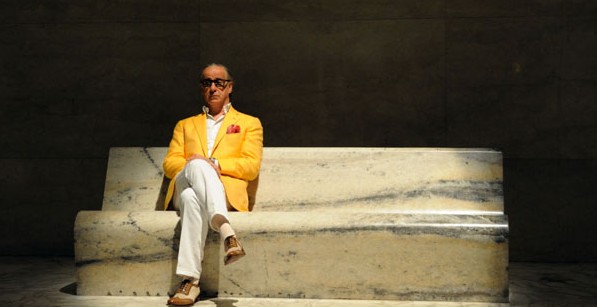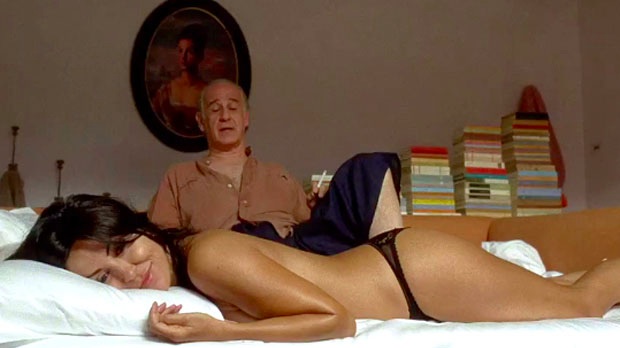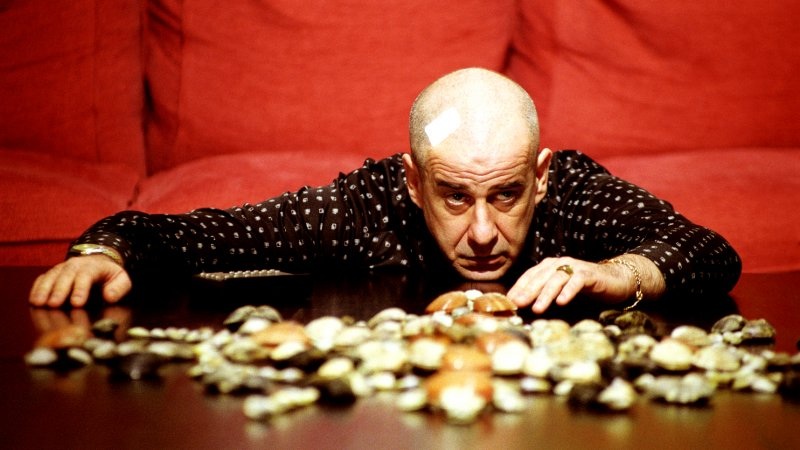Italian filmmaker Paolo Sorrentino has directed six feature films, but only three of them have been released in America. Ambitious, surreal movies like Il Divo (2008) and This Must Be the Place (2011) are typified by lithe tracking shots and hilarious, provocative one-liners. The Great Beauty, Sorrentino’s latest drama, which opens in the U.S. this week, crystallizes his unique style and outlook on life. Set in contemporary Rome, the film is a character study about Jep Gambardella (the typically excellent Toni Servillo, a regular Sorrentino collaborator), a jaded, taste-making journalist. Jep, a self-involved bachelor, is at an impasse: having only written one novelette, he’s uneasy at the thought of starting a second book now that he is in his sixties. Keyframe talked to Sorrentino about the look of his films, his preference for older protagonists, and his love of solitude.
Keyframe: Watching The Great Beauty confirmed something for me: thinking about your previous films, I felt you wouldn’t be interested in making a film about a younger protagonist. Your characters are usually like Jep in that they’re trying to remain or re-discover the way to stay in the present moment. Is that unique to getting older?
Paolo Sorrentino: Yes, though I think in the future, I may do a film with younger protagonists. Now that I’m older myself, I may finally tackle that. You’re right, my protagonists tend to be people who need to learn how to be in the world. The reason my protagonists tend to be on the older side is I’ve always been fascinated by adults, not younger people. That could be for biographical reasons. I grew up in a world where I was always surrounded by adults. So it could be that as well.
Keyframe: In previous interviews, you’ve said your character are essentially prisoners that are incapable of escaping the circumstances of their lives. That speaks to the epiphany Jep is searching for throughout The Great Beauty: he wants to be re-assured that, on some level, the finite-ness of things is OK. Do you find that kind of exile, or maybe that kind of isolated lifestyle, is especially romantic, or intriguing?
Sorrentino: What do you mean by ‘isolated lifestyle?’
Keyframe: It’s like that image of One Man Up of a character trapped in his fishbowl. There are limits to these characters’ lives; they’re very self-involved, but not self-absorbed.
Sorrentino: Yes, there is romanticism in solitude, in that isolated lifestyle.
Keyframe: For Jep, how is that mentality informed by contemporary Rome, or where you are right now in your life?
Sorrentino: Similarities with my own life aren’t that interesting; I don’t need to talk about myself. But my points of view are similar to [Jep’s]. Like him, I’m involved in a world in which I have one foot on the inside, and one foot on the outside. We have one foot on the inside because we’re stuck by our circumstances, and are forced to deal with them. But we’re on the outside because of the job we do: observers, and re-inventors of this world. So we have to describe it, we have an external outlook on [the world], and end up being part of it for other reasons.
This is what Jep does, indeed: he’s surrounded by this universe that’s like an eternal Mardi Gras. And when everyone goes to these excessive, extreme parties, the feeling one has is that they’re nothing but fake-ness and superficiality. He starts his limping, tentative search for truth which will only come to the end thanks to the meeting with that nun.
Keyframe: Speaking of ‘that nun,’ she has that great line: ‘Roots are important.’ Jep’s character arc is interesting because he learns that he has to stop moving in place. Now, you pre-visualize, and pre-score your films so that you can focus with working with your actors. When did you know how Jep’s story would end?
Sorrentino: I always had the ending very clear in my mind. I always knew that everything that accompanied this character’s life wound wind up there. This was the idea I had from the outset.
Keyframe: Did working with Toni Servillo change, if not the outcome, then how you reached that ending?
Sorrentino: No, this ending would have been that way under any circumstances regardless of which actor was playing it.
Keyframe: All of your movies after One Man Up have been shot in a 2.35 aspect ratio. This makes me think you visualize and approach all your films as a strictly imaginary space. Is that fair?
Sorrentino: I’ve never thought of that, but it’s bound to be true.
Keyframe: How does that change the way your characters behave?
Sorrentino: That [2.35] format allows you to do what I try to do in all of my films, which is basically a stylization of things.
Keyframe: Your films are often described as Felliniesque. I feel like the Italian film industry, from my admittedly limited experience, is your fishbowl. The arbitrary rules of what gets distributed and what doesn’t get seen outside of Italy are labyrinthine. Do you care about the way your films are presented outside of Italy?
Sorrentino: I consider myself lucky, and I don’t want to be critical of the Italian film industry. I’m lucky enough that I’m able to make films in Italy and abroad and selfishly, I can say I’m privileged. I don’t experience all these issues, or I experience them to a lesser extent than other people. It’s true that other people’s films are harder to find in the U.S.A., but the thing is the Italian film industry is reflective of a small country. All film industries’ products are hard to find outside of their own country.
But the flipside is, in a small country like ours, we have unexpected spaces for freedom which you no longer have in larger markets, where one, as a filmmaker, is a lot more monitored. There are pros and cons to this. So we all wish or want Italian films to be more readily available abroad as they were years ago. But this can be connected to the work we do as filmmakers. Because if our films are so good that they have to be shown here, we’re on a different scale, and they have to be shown everywhere.






